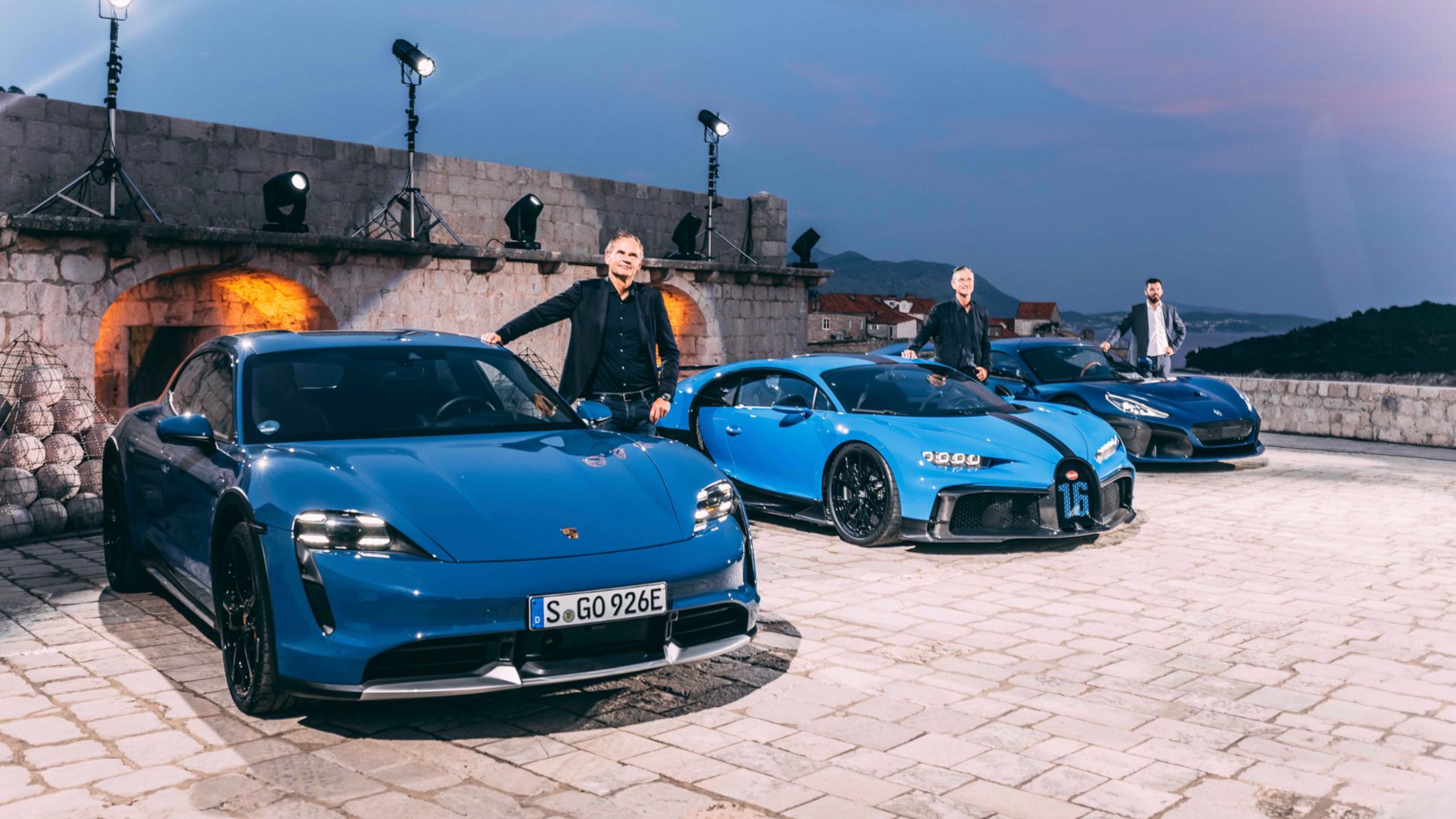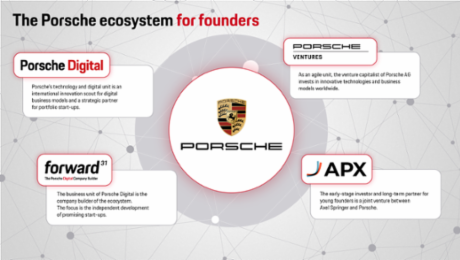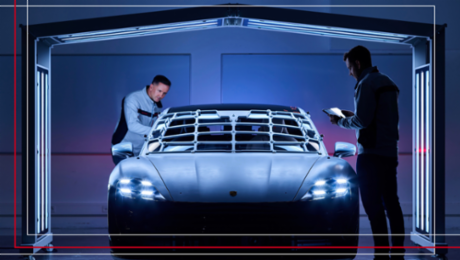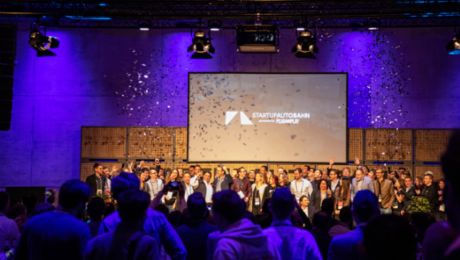Since 2016, Porsche AG has been strategically active in the fields of funding and start-up investments, as well as scouting and incubating young up-and-coming companies. In doing so, the sports car manufacturer focuses on the creative, the new, and a digital and user-centric approach. The following five examples are sustainable success stories and innovative models of cooperation from the company’s start-up ecosystem.
1. Innovative development partnership with Rimac Automobili
Croatian company Rimac Automobili develops and produces components for electromobility and manufactures its own electric-powered supercars. In light of its push towards sustainable electric driving, Porsche initiated a development partnership with Rimac, followed by an initial investment in 2018. Its shareholding now stands at 24 per cent.
“Since 2018, Porsche has been a great supporter of our company. It’s a great privilege that one of the most famous sports car brands in the world is part of Rimac,” says the founder and CEO, Mate Rimac. “We pride ourselves on working together developing exciting new electrified products. As we have many car manufacturers as customers worldwide, it’s important for both Rimac and Porsche that we remain a completely independent company. This partnership helps Rimac to develop and grow, which is beneficial for all our customers.”
A fast-growing company based in Sveta Nedelja near Zagreb, Rimac Automobili employs around 1,000 people, who develop and manufacture supercars with up to 2,000 PS and top speeds of more than 400 km/h. Rimac also supplies technology and systems for the electric cars of several well-known manufacturers. In July 2021, Porsche and Rimac announced the creation of a joint venture involving Bugatti, the French hypercar manufacturer, under the name Bugatti-Rimac. Rimac will hold 55 per cent of shares, with Porsche claiming a 45 per cent stake. Bugatti-Rimac combines the genes of some of the strongest and most innovative automotive brands: Bugatti, Porsche and Rimac.
2. Start-up &Charge promotes electromobility
Porsche Digital strategically expanded its business portfolio by launching &Charge. The spin-off e-mobility company offers a digital platform that enables users to receive credits for their online purchases in the form of ‘kilometres’ for electrified travel. Through this scheme, the Frankfurt-based start-up is offering the first loyalty programme for e-mobility in Europe.
“With our platform, we want to make a contribution to the transformation of mobility. Through this, we are putting customers at the centre and creating lucrative incentives for sustainable driving,” explains Eugen Letkemann, CEO of &Charge. “It is therefore crucial that we can offer our users a broad portfolio of offers – both in the collection and redemption of ‘kilometres’.” &Charge has been a climate-neutral company since its foundation, and strives to avoid, reduce and compensate not only the CO₂ emissions of its own business activities, but also those of its users. Customers can also use their ‘kilometres’ to support certified climate protection projects.
3. TriEye’s sensor technology enables the next generation of driver assistance systems and autonomous driving functions
In 2019, Porsche acquired a minority stake in the Israeli start-up TriEye as part of a Series A funding round. The young company has developed sensor technology for short-wave infrared (SWIR). This increases the safety of vehicles equipped with driver assistance systems or autonomous driving functions by offering improved visibility at night or in adverse weather conditions such as dust, fog or rain. The company's unique semiconductor design uses a technology that will enable SWIR HD cameras to be manufactured at a fraction of their current cost in the future.
“Our mission is to reduce the risk of accidents in all weather and light conditions in order to save lives,” says Avi Bakal, CEO and co-founder of TriEye. “We recently expanded our funding round and added Porsche as a strategic investor. This is further proof that SWIR is a key component for sensor technology, which will enable the development of safer and better driver assistance systems and autonomous driving functions."
4. The interactive home mirror from VAHA – with artificial intelligence
Berlin-based start-up VAHA has developed an interactive fitness mirror that uses artificial intelligence to open up new training opportunities for people to work out from the comfort of their own homes. Customers can enjoy more than 500 on-demand workouts on the smart device – from endurance and weight training to yoga. Artificial intelligence analyses each movement and, where possible, corrects the exercises in real-time in front of the mirror. In addition, every VAHA customer can participate in live classes, where they are connected virtually with other users. Personal training courses can also be booked via the mirror’s surface – putting users in one-to-one contact with an instructor.
“At VAHA, we have an excellent team of founders with years of experience in the sports and fitness sector who are making investments in this field alongside other very successful financiers,” says Oliver Frenz, Head of Porsche Ventures Region Europe and Israel. “Porsche Ventures is therefore further expanding its portfolio in a new market segment.”
London-based investment firm Unbound is also involved with VAHA, while Germany’s international football goalkeeper Manuel Neuer recently joined the company as a partner. VAHA’s Managing Director Valerie Bures-Bönström is delighted about Porsche Ventures' decision to invest. “We are very happy to have Porsche on our side. This provides scope for some great opportunities and further cooperation in the future.”
5. RYDES bundles mobility providers together on a digital platform
Together with the Lufthansa Innovation Hub, Porsche Digital’s company builder Forward31 founded RYDES. The young start-up’s goal is to bundle together the numerous forms of mobility offered by various providers on a single digital platform in a customer-oriented way. These include car- and bike-sharing, e-scooters, shared taxis and public transport services. Users can plan and book their journeys individually via the app. It is aimed at companies that wish to provide their employees with individually bookable mobility offers as an additional service. Companies can provide their employees with a so-called ‘mobility budget’ via the app for this purpose.
“The spin-off and subsequent financing of RYDES has been a great success. Once again, we are proving that start-ups from Group digital units can connect to markets,” says Gleb Tritus, Managing Director of Lufthansa Innovation Hub. “With Forward31 we have gained an important strategic partner that both shares and enriches our vision of a seamless mobility chain.”





